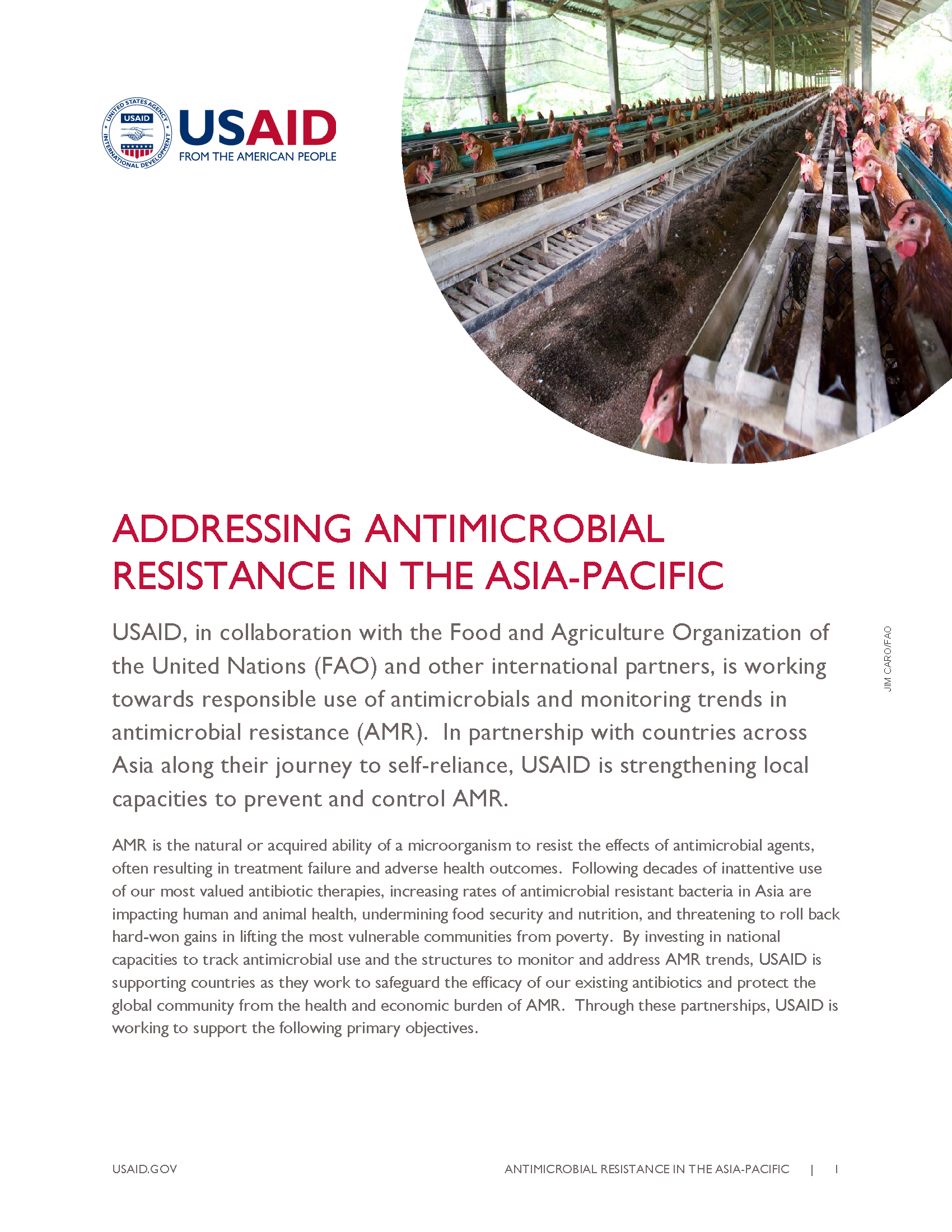Speeches Shim
USAID, in collaboration with the Food and Agriculture Organization of the United Nations (FAO) and other international partners, is working towards responsible use of antimicrobials and monitoring trends in antimicrobial resistance (AMR). In partnership with countries across Asia along their journey to self-reliance, USAID is strengthening local capacities to prevent and control AMR.
AMR is the natural or acquired ability of a microorganism to resist the effects of antimicrobial agents, often resulting in treatment failure and adverse health outcomes. Following decades of inattentive use of our most valued antibiotic therapies, increasing rates of antimicrobial resistant bacteria in Asia are impacting human and animal health, undermining food security and nutrition, and threatening to roll back hard-won gains in lifting the most vulnerable communities from poverty. By investing in national capacities to track antimicrobial use and the structures to monitor and address AMR trends, USAID is supporting countries as they work to safeguard the efficacy of our existing antibiotics and protect the global community from the health and economic burden of AMR. Through these partnerships, USAID is working to support the following primary objectives.
RAISING AWARENESS ON ANTIMICROBIAL RESISTANCE
Building a robust understanding of the drivers of AMR in human health and livestock production settings is a cornerstone of good antimicrobial stewardship practices in Asia. USAID support is developing and delivering targeted education and training materials, launching advocacy and social media campaigns, and promoting an enhanced awareness of the causes, and solutions, in the battle against AMR. Through the annual celebration of World Antibiotic Awareness Week, USAID is fostering regional engagement and advocacy that will help generate a groundswell of action in mitigating AMR impacts.
IMPROVING UNDERSTANDING OF ANTIMICROBIAL USE
Developing structures to monitor antimicrobial use helps direct targeted interventions and promote sound antimicrobial stewardship while ensuring access to life-saving antimicrobials in under-resourced communities. Data from these activities will inform the development of awareness, advocacy and communication tools, supporting actionable steps and best practices that can be taken to rightsize antimicrobial use and measurably reduce rates of AMR.
ENHANCING MONITORING AND SURVEILLANCE OF AMR
With USAID support through FAO, a set of surveillance guidelines are being developed to directly support national veterinary and livestock production authorities in Asia in the design and implementation of critical AMR surveillance programs. Flagship activities include assessments of national AMR action plans, training national authorities charged with surveillance systems and laboratories, and support to countries’ AMR surveillance activities. USAID’s partnership with Chulalongkorn University is delivering regional support, and Chulalongkorn’s Faculty of Veterinary Science has been globally designated as an FAO AMR Reference Center.
STRENGTHENING NATIONAL AND REGIONAL PLATFORMS
Through USAID support, academic and private sector networks are being established to promote antimicrobial stewardship in Asia. New activities are aimed at building the capacity of private sector organizations to advocate across their constituencies for adoption of best practices and interventions in livestock production.
IMPACTS AND RESULTS
Through this multi-pronged approach advancing national capacity to mitigate AMR threats, USAID aims to improve the health and livelihoods of communities--and the livestock they rely upon--across the Asia-Pacific, ensuring healthy, more prosperous, and resilient communities for generations to come.


Comment
Make a general inquiry or suggest an improvement.